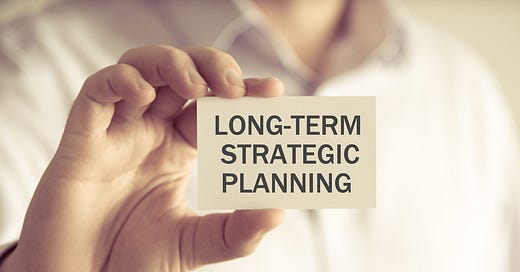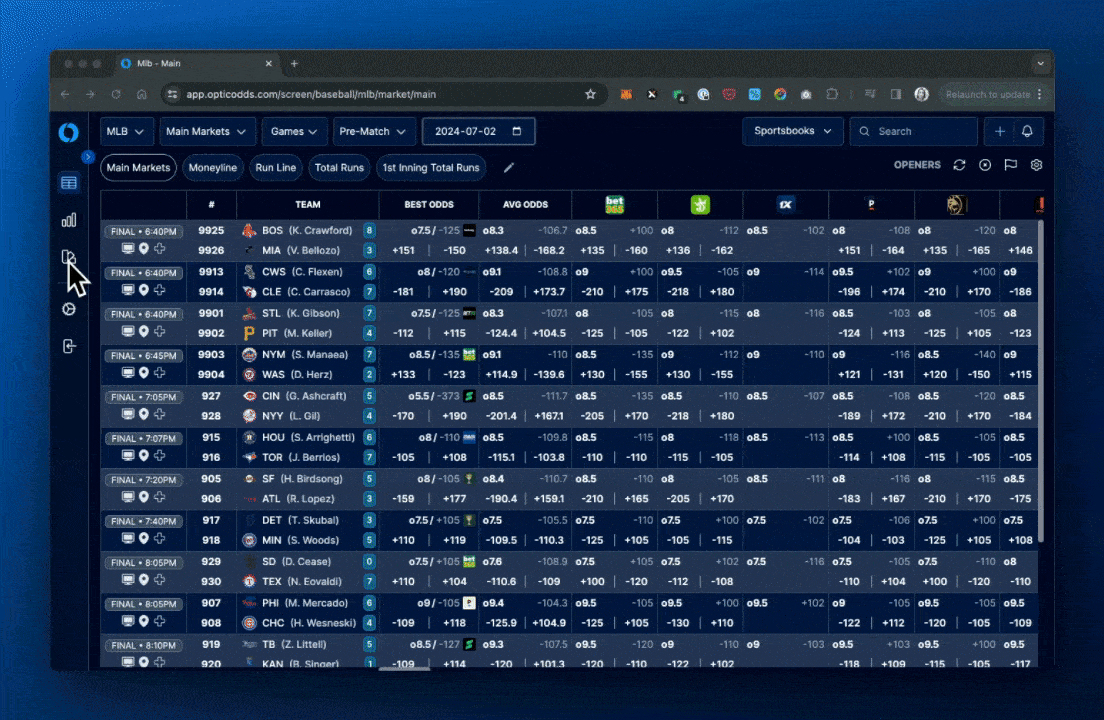Playing The Long Game
Supporters call Texas casinos a long-term project. Massachusetts no longer the top lottery state. Are operators cutting back on sports betting CPAs?
The Bulletin Board
NEWS: Adelsons call Texas casinos a “long-term” project.
NEWS: Massachusetts is no longer the top lottery (per capita) in the US.
QUICK HITTER: At least one operator is reducing affiliate CPAs.
VIEWS: DC is down to zero mobile sports betting operators after FanDuel temporarily stopped accepting bets.
AROUND the WATERCOOLER: Sports betting hold rates are rising, and tax rates might have a similar trajectory.
STRAY THOUGHTS: Rampage and Bas, how can you not listen?
SPONSOR’S MESSAGE - Sporttrade was borne out of the belief that the golden age of sports betting has yet to come. Combining proprietary technology, thoughtful design, and capital markets expertise, our platform endeavors to modernize sports betting for a more equitable, responsible, and accessible future.
Sporttrade’s newest feature, The Tape, prints all trades made on the app in real-time.
Texas Casinos a Long-Term Project
The high-powered duo of Miriam Adelson and Mark Cuban are trying to bring resort casinos to Texas and end the state’s long-held opposition to legal gambling.
Adelson purchased a majority stake in the Dallas Mavericks from Mark Cuban (who is staying on to run the team) in a $3.5 billion deal that many believe is rooted in Adelson’s desire to build a resort casino in Texas.
Las Vegas Sands has been lobbying hard for resort casinos. In 2022, the Houston Chronicle reported that more than 300 gambling lobbyists were registered in the state, with LVS alone employing 72.
Progress has been slow, which is fine with LVS. Mavericks’ owner and LVS President and CFO Patrick Dumont recently called Texas casinos a long-term commitment. “We’re patient. We think long-term. We’re not people who think in the short term,” Dumont said.
2023 saw some progress, with the Texas House voting on but failing to pass legislation that would have authorized up to eight resort casinos. There was no progress in 2024, as the Texas legislature only meets in odd-numbered years.
The odd-year sessions are challenging for complex and divisive issues like gambling expansions, but the real roadblock is the Senate.
Due to a legislative rule, the lieutenant governor has the final say on what bills the Senate takes up. If you have an anti-gambling lieutenant governor, like current Lt. Gov. Dan Patrick, the chance of a gambling bill being discussed goes way down.
Despite the progress it made in 2023, the House is putting the ball in the Senate’s court. According to State Rep. Jeff Leach, any gambling expansion efforts in 2025 will have to start in the Senate.
“Based on what happened last session, I believe it’s generally understood that unless and until there is real movement and momentum in the Senate next session — meaning the Senate actually taking up and considering the issue — there is likely not going to be any meaningful action on it in the Texas House,” Leach told The Dallas Morning News.
If that wasn’t bad enough, the Texas Republican Party released its new party platform that includes the following statement, “We oppose any expansion of gambling, including legalized casino gambling,” and calls on GOP politicians to refuse donations from gambling organizations.
Will Texas eventually authorize casino gambling? Almost certainly. Will that happen in 2025? It doesn’t look overly promising, which pushes legalization to 2027 or beyond.
RI Overtakes MA in Lottery Sales Per Capita
When it comes to sales, the Massachusetts Lottery has always been the benchmark, often referred to as the “Gold Standard” by its peers. However, the Bay State was recently surpassed by its southern neighbor, Rhode Island.
According to research by Lottery Geeks (using data from the North American Association of State and Provincial Lotteries), Rhode Island is the nation’s top-performing lottery, with ticket sales of $939 per resident. Massachusetts slid back to second place at $877, and Maryland rounded out the Top Three with average ticket sales of $845 per resident.
While these numbers look bawdy, it works out to about $18 per week per resident.
Going beyond the Lottery Geeks study, on a per-adult basis, average annual ticket sales balloon to $1,237, or nearly $24 per week.
If we get a little more granular, roughly 50% of adults participate in the lottery, and only about 25% play regularly, with the other half purchasing tickets during large jackpots or around the holidays.
Doing some back-of-the-envelope math, the amount spent on lottery tickets in Rhode Island (and beyond) starts to look a little more problematic. The 25% of the adult population that regularly plays the lottery spends upwards of $100 per week.
Further, there would be a Pareto Curve within that cohort. There would be many weekly and daily draw game players in the $10, $20, or even $50 range, and then a sharp increase toward instant win players burning through hundreds of dollars a week.
That said, people do win playing the lottery, and it’s not just a jackpot game. As Lottery Geeks reported, of the $939 per capita spent, Rhode Islanders recouped $397 on average. That’s a terrible return, but it does soften the above numbers, at least a little bit.
SPONSOR’S MESSAGE - Underdog: the most innovative company in sports gaming.
At Underdog we use our own tech stack to create the industry’s most popular games, designing products specifically for the American sports fan.
Join us as we build the future of sports gaming.
Visit: https://underdogfantasy.com/careers
Quick Hitter: Are Operators Less Reliant on Affiliates?
Affiliate CPAs are dropping like a stone, at least at Rush Street Interactive.
“In Q1, we had our highest number of first-time depositors ever as a company and the highest in North America since our launch in New York in the first quarter of 2022,” Rush Street Interactive President and CEO Richard Schwartz said during the company’s Q1 earning’s call, adding that “we've been able to do this while lowering our CPAs to less than half of what they were a year ago.”
Schwartz pointed to the “renewal of our partnership with sports broadcasting legend Mike Francesa” and a “partnership as a title sponsor for the NASCAR Xfinity Series Dash 4 Cash race” as alternative ways the company was using the BetRivers Network to market to players. He also highlighted the hiring of Brian Sapp as CMO, signaling a “commitment to returns-based marketing.”
The value of affiliate CPAs is definitely something to watch as there are few new market launches on the horizon.
And Then There Were Zero: FanDuel Pulls the Plug on DC
Watching the trainwreck that is DC sports betting is reminiscent of watching Greg (Ben Stiller) dig himself into a deeper and deeper hole in Meet the Parents.
DC’s decision to open its sports betting market to more online operators was largely applauded, but an expected launch on Monday never happened (Mayor Muriel Bowser has yet to sign the budget bill that expanded the mobile sports betting market).
Making matters worse, the budget extends legal sports betting in the city, so with no contract in place, FanDuel, the only operator in the city, has stopped accepting bets altogether.
FanDuel confirmed with Sports Handle that it “stopped accepting online bets Tuesday as it awaits approval of the FY 2025 budget, which allows for the continuation of sports betting in the District.”
When the budget is approved, FanDuel will no longer need Intralot (which hired FanDuel as a subcontractor to supply mobile betting in DC following the absolute failure of Intralot’s GamBet DC app).
Instead, FanDuel “will resume its sports betting offering as a Class A operator in partnership with DC United at Audi Field and continue to offer our citywide mobile app to the District of Columbia,” a FanDuel spokesperson told Sports Handle.
As reported yesterday, Mayor Bowser has until July 25 to sign the budget.
SPONSOR’S MESSAGE - Join hundreds of operators using OpticOdds for trading, risk management, and Same Game Parlay analysis.
Real-time data and trading tools for sports betting + fantasy operators. Built by those who have done it before.
Looking to join the fastest-growing data provider in the sports betting industry? Join the team now.
Around the Watercooler
Social media conversations, rumors, and gossip.
Another intriguing slide from Chris Grove’s EGR North America Briefing (I posted about the presentation last week) shows the upward march of US sports betting hold rates:
During legalization efforts, the industry made a big deal of highlighting a historical sports betting hold rate of around 5% as a reason to keep tax rates modest. That argument was brought up in Illinois (which raised its tax rate from 15% to a graduated rate that climbs as high as 40%), and from what I’m hearing, it will come up in other locales.
Stray Thoughts
Quinton “Rampage” Jackson has, hands down, the best MMA/Fighting podcast. The podcast has great guests and very casual conversations with people he has existing relationships with, and Rampage has the ability to get people to open up. I’ll link to the Bas Rutten episode because it’s Bas Rutten, so you know it will be a wild ride — I also highly recommend the Royce Gracie episode.







